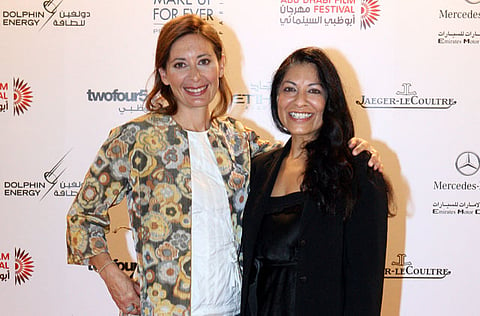Models and militants face-off at ADFF
The common ground between Indian beauty queens and fundamentalists revealed in documentary

On the surface, the worlds of a Miss India hopeful and an aggressive Hindu fundamentalist militant are radically different. While contestant Ruhi from a small town in Jaipur is vying for the Miss India World crown, there’s the tomboyish twenty-something Prachi teaching young Hindu girls to hate girls like Ruhi. But after 90 minutes of Nisha Pahuja’s documentary, The World Before Her, you may change your perception.
How does she achieve it? The Toronto-bred filmmaker takes you first into a beauty boot camp in Mumbai, where bikini-wearing girls are learning how to twirl well in heels — then into a militant training camp run by the Durgha Vahini, the women’s wing of a Hindu fundamentalist movement where girls are shown how to hold a rifle. Their ideologies and outlooks are different, but both groups are surprisingly on the same quest: To gain respect and exercise the freedom to make their own choices.
“Both these women are living in a particular moment in their country’s history. India is in transition and all these parallel realities exist in India,” Pahuja said after receiving a standing ovation at the film’s Abu Dhabi Film Festival screening on Sunday night.
She also attained the impossible. The viewers were left rooting for both girls and were even warming up to Prachi despite her extremist ideologies (she hates Gandhi, Muslims, Hindus, Aishwarya Rai Bachchan, Priyanka Chopra). An insight into her upbringing, where she’s conditioned to hate by an abusive father, makes you wonder if she’s really to be blamed for her fundamentalist mental make-up. On the other end of the spectrum, there was the Miss India hopeful Ruhi, who just wants to make her parents proud and stand tall.
“That’s one of the things that I wanted the viewer to take back with them. It’s important not to hate people who you think are wrong. It’s important to have compassion for all those who don’t share your same views,” said Pahuja. This documentary, which won this year’s Best Documentary prize at the Tribeca Film Festival, has been showcased at fifty other film festivals. After ADFF, the film is tipped to travel to India in November.
Pahuja also happens to be the first filmmaker who was given the access to film in a training camp run by VHP.
“I think I wore them down. It took me two years to convince them. I even moved to India for that. I just refused to leave and finally I managed to convince them.”
Excerpts from our interview with the director:
Do you fear a backlash in India since it exposes the thought process behind Hindu fundamentalist groups?
Anything can happen in India and it’s hard to determine people’s reactions. But to be honest, I am worried about Prachi. I worry whether the people in the movement will be angry about what she said in the documentary. But I have already shown the film to Ruhi and Prachi. They liked it and what is interesting is that they ended up liking each other. During the contest, Prachi’s parents [traditional outlook] were rooting for her. All seemed to be happy.
Were you tempted to take sides while making the documentary? Ruhi represents all things modern and progressive in India and Prachi is all about traditions.
I don’t know whose side I am on. On both sides there are problems and I understand that. I get what they feel and where they are coming from. With Hindu fundamentalists, they are governed by the fear of losing their culture and their overwhelming thought about being taking over by Western materialism. I don’t agree with their political beliefs or their anti-Christian, anti-Islam beliefs but it’s their voice. With girls in a beauty pageant in India, it provides them with a certain platform to claim their identity.
How did the idea for the documentary germinate?
In 1999, I was in Mumbai at a party where Yukta Mookey [Miss World 1999] was being decorated for her win. At the party, the people were so overjoyed that they were treating her like she had won an Olympic gold medal. In the West, I felt beauty pageants are considered quaint, but in India I got the distinct feeling that it meant something else. It was almost a symbol of women’s empowerment. Fast forward a few years later, I researched it and learnt about the opposition to Indian beauty pageants.
What was the toughest part about making The World Before Her?
It was tough to raise funds. It took me three years to make this film and I am glad it’s over. I won’t tell you the number of hours that we shot, but we took four or five months just to watch the footage and to process it all in our minds. It was extensive.
What do you hope the viewers will take back from this documentary?
Two things: In order to have a true democracy everyone has to be equal. It is the only way that India will ever survive. They can’t sustain for long with the way it is now. But I think the other thing is that it is important not to hate people who you think are wrong. It is important to have compassion for all those who don’t share your same views as you. It is the only way we will have profound meaningful change.
Sign up for the Daily Briefing
Get the latest news and updates straight to your inbox



